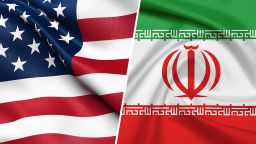Editor’s Note: Aaron David Miller is a senior fellow at the Carnegie Endowment for International Peace and author of “The End of Greatness: Why America Can’t Have (and Doesn’t Want) Another Great President.” Miller was a Middle East negotiator in Democratic and Republican administrations. The opinions expressed in this commentary are those of the author. View more opinion at CNN.
Having spent a couple decades in and around failing Arab-Israeli negotiations, I know a negotiation that’s in serious trouble when I see one. The Iran nuclear negotiations that resumed this week in Vienna after a suspension of almost five months are a case in point.

Indeed, right now, probably neither the Biden administration nor Iran’s Supreme Leader believes a mutually acceptable agreement is feasible. And it’s not so certain that one of the parties – Iran, which seems to be using the talks as cover to ramp up its nuclear program – believes that an accord is even desirable right now.
All of which is to say that the game has just begun, and the outcome will be neither a quick accord nor a collapse. Indeed, today Iranian representatives presented texts of their own on sanctions removal and their own nuclear activities, offering to stay in Vienna to continue negotiating. Instead, we’re likely in for a prolonged game of maneuvering and pressure by each side to achieve what they want, or failing that, to ensure that, if talks do crater, the other side takes the lion’s share of the blame.
As a general rule, an impasse in negotiations is broken when there are sufficient amounts of pain and gain present to change the parties’ calculations. As anyone who’s been a part of a negotiation will tell you – whether it’s with the Israelis, Palestinians, or Russians – pressure and pain alone rarely if ever work, especially when a nation perceives its vital interests are at stake.
President Trump’s maximum-pressure campaign against Iran is an example. Sanctions severely damaged Iran’s economy, but they didn’t force Iran to make concessions; in fact, Trump’s sanctions resulted in Iran ramping up its nuclear program.
The challenge facing the negotiations today is that the factors that led to the 2015 Iran nuclear accord are all missing. As US Special Envoy for Iran Robert Malley noted, the combination of pressure and inducements that led to the previous accord are no longer in alignment.
Moreover, the unilateral US withdrawal from the accord; Iran’s breaching of the agreement by expanding its uranium enrichment, after initially adhering to the pact after the US abandoned it; additional US sanctions; Iran’s refusal to allow IAEA monitoring of sensitive nuclear sites have not only shattered what trust and confidence existed, particularly between the US and Iran; but also raised serious questions – with some key provisions due to sunset by 2025 – about whether the original agreement was becoming obsolete and irrelevant.
To make matters worse, since US withdrawal from the accord in 2018, the politics on both sides have hardened significantly. A new, harder-line Iranian government came to power in June and the Supreme Leader – clearly never a fan of the original accord – has now publicly admitted it was a mistake.
The uptick of withering criticism of the previous Rouhani government by a new foreign minister and of the very process of negotiations by a new harder-line lead negotiator have created a set of fanciful demands that will be hard for Iran to simply amend or drop without additional concessions from Washington.
As for the Americans, the Biden administration’s intention to rejoin the accord was complicated by the President’s other priorities; the new web of sanctions imposed on Iran by his predecessor; by Biden himself; and by growing opposition by Republicans and some Democrats alike to an accord that didn’t cover Iran’s efforts to spread its influence in the region, especially its support for pro-Iranian groups striking US military bases in Syria and Iraq and its burgeoning ballistic missile programs.
Indeed, even if, by some miracle, Biden was able to rejoin the nuclear deal anytime soon, it would likely be a political liability for a president whose approval ratings are tanking. One can be forgiven for imagining Biden’s political advisers urging him to delay any would-be reentry into the reviled (at least by some in Washington) JCPOA.
Suffice to say, things don’t look good as a seventh round of negotiations between Iran, the Europeans, Russians and Chinese opened in Vienna. (Iran still refuses to meet directly with the US.)
Whatever else happens in Vienna this week, not a great deal of progress is likely to be made. Indeed, if Iran comes back with new and fanciful demands, as its foreign minister and lead negotiator have recently outlined – i.e., that the talks have nothing to do with the nuclear issue, only removing ”inhumane” US sanctions, one can imagine a game of gotcha with each side trying to persuade its friends and the rest of the world that it’s the other party who’s being unreasonable. Former Secretary of State James A. Baker called this tactic ”dead cat diplomacy,” where he’d lay the dead cat at the doorstep of the most recalcitrant party.
Malley, the US envoy, hinted at such an approach in a recent BBC interview where he suggested that if Iran overplayed its hand, the world would come to see that Tehran had a chance to strike a deal but chose not to.
Iran is preparing its own talking points to try and lay the blame at Washington’s door, asking how Iran can enter another deal without a US guarantee that it won’t bolt again. Iran will be counting on Russia and China to take its side in the gotcha sweepstakes.
This round of negotiations may initially turn on what Iran brings back to the table after a delay of five months. And it’s likely that neither the US, Iran or the Europeans, Russia and China want the talks to end. But if they do, we’ll be lucky to escape with a game of gotcha.
Alternatives to reentering the JCPOA – a smaller deal, less sanctions relief for fewer curbs on Iran’s nuclear activities or a longer and stronger accord that extends the curbs on Iran’s nuclear activities – seem unrealistic. Israel’s so-called Plan B discussed with the Biden administration – more sanctions; cyber war; and threat of military action against Iran’s nuclear sites – is a plan that Biden, preoccupied with domestic priorities, doesn’t want to embrace.
The last thing the President needs now is an Iranian-Israeli blow-up that drags the US into a war with Tehran. But if negotiations don’t succeed, sooner or later that may be where we’re heading. As one British journalist wrote, there’s more snow in Vienna these days than optimism.
This piece has been updated to reflect the latest events.





